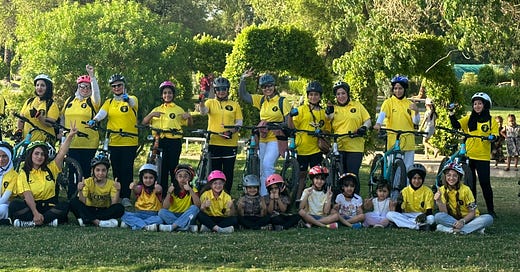Peddling Equality
Suad El Gohary is inspiring Iraqi women to ride their bikes and show the next generation that cycling is not just a sport for men
It’s rare to see a woman riding a bicycle in Baghdad, so when Suad El Gohary pedals past a fellow female cyclist, she marks the moment with a wave. These days, she no longer feels like the only woman riding a bike around Iraq’s capital city, largely thanks to the cycling group she created, which is pushing back against conservative cultural norms to carve out space for female cyclists in Iraq.
“Many women want to cycle but are forbidden by their families. We have one woman who came in secret with her daughters because her husband wouldn’t allow it,” says El Gohary, 53. Her ambition is to change this by empowering women to ride their bicycles freely through the streets of Baghdad and other Iraqi cities. In time, she hopes a new generation will see it as a normal part of everyday life.
So far, there have been small but promising signs of change. “It’s still rare, but nowadays I do encounter other women cycling around,” says El Gohary, who founded the Palm Watan cycling team during the pandemic when the lockdown imposed strict limits on movement and using cars. “Cycling became really popular in Baghdad after Covid. There are lots of men who get together and ride for fun, but ours is the only female group” she adds.
El Gohary works as a journalist, covering social and political issues for Iraqi media. Her profile and network have helped her gain traction for the team, which is gathering support across the country as more Iraqi women embrace the opportunity to ride a bike. “I’m now seeing females in other cities who want to ride their bikes with us - in Kirkuk, Basra, Diyala – they are asking us to expand to their regions,” El Gohary says.
The freedom and mobility of riding a bicycle cause controversy in Iraq, where many feel it flouts strict social codes. For some, the image of a woman riding a bicycle is a flagrant violation of behavioral norms, and El Gohary has at times been harassed on the street for riding her bike. “I’m always a bit worried on my bike because men look at me in a very weird, sometimes aggressive way,” she says.
Not long ago she sustained a serious eye injury after a man attacked her in the street for riding her bicycle. But she refuses to be cowed. For her, cycling has been transformative, and she wants to share the freedom and benefits of riding a bike with women across Iraq.
“After suffering from joint pain for years, the doctor advised me to take up exercise. I tried the bike, and I loved it. I became a happier, healthier person,” she says. But it was during the pandemic that she decided to encourage more women to try it too. Baghdad was under lockdown and a curfew was in place so people were struggling to get hold of their daily necessities.
“I started contacting women that I know and offering to buy their groceries and bring them on my bike,” says El Gohary. This soon inspired other women, so she started teaching them to cycle, and they quickly became a team. Now, they are training children – both boys and girls – how to ride bikes and supporting them to compete in national events. Ultimately, she hopes to change the culture around cycling in Iraq and encourage the next generation to embrace the sport.
With support from an Ideas Beyond Borders Innovation Hub grant, she plans to expand their activities to Mosul and teach children there how to ride a bike. The grant also covers the purchase of new bicycles so they can practice and then participate in races in the future. “We’re trying to create a connection between these young boys and girls so that when they grow up, males will look at them more as equals because they trained together as kids.”
She visited Mosul recently to witness the city’s first all-female cycling marathon. Friends advised her to rest as she recovers from eye surgery following the attack, but she is determined to keep going. “Things are starting to change. I can’t let the momentum die down,” she says.





